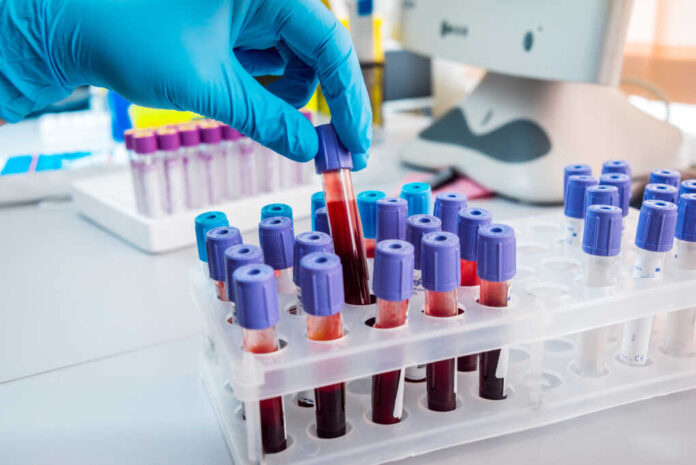
The FDA has cleared the first blood test for diagnosing Alzheimer’s disease, potentially revolutionizing how millions of Americans receive diagnoses and treatment for this devastating condition.
At a Glance
- The FDA-cleared Lumipulse blood test offers a less invasive alternative to PET scans and spinal taps for diagnosing Alzheimer’s disease
- The test detects amyloid plaques with high accuracy – 91.7% of positive results and 97.3% of negative results match traditional diagnostic methods
- Designed for adults 55+ with memory problems, this test could dramatically increase accessibility to diagnosis for the estimated 7.2 million Americans living with Alzheimer’s
- The blood test is intended to complement other clinical evaluations, not as a standalone diagnostic tool
A Breakthrough in Alzheimer’s Diagnosis
The FDA has cleared the first blood test for diagnosing Alzheimer’s disease, marking a significant advancement in how this devastating condition is detected. The Lumipulse G pTau217/ß-Amyloid 1-42 Plasma Ratio test, developed by Fujirebio Diagnostics, measures two proteins in blood plasma to detect amyloid plaques, a hallmark sign of Alzheimer’s disease. This test provides a less invasive option compared to current methods like PET scans and spinal taps, which are often costly, uncomfortable, and less accessible to many patients.
The new blood test is specifically designed for individuals 55 and older who are experiencing memory problems or symptoms of cognitive decline. Clinical studies demonstrated impressive accuracy, with 91.7% of positive results and 97.3% of negative results aligning with the findings from PET scans or cerebrospinal fluid tests. This high level of accuracy gives healthcare providers a reliable tool that could transform how Alzheimer’s is diagnosed and managed, especially in primary care settings.
Is this a new blood test an important milestone in making an Alzheimer’s diagnosis? What do you need to know? This week, the FDA cleared a first-of-its-kind blood test, the Lumipulse G pTau217/β-Amyloid 1-42 Plasma Ratio to support the diagnosis of Alzheimer’s disease in folks… pic.twitter.com/PEq8vdIuAf
— Michael Okun (@MichaelOkun) May 21, 2025
Expanding Access to Diagnosis
One of the most significant benefits of this blood test is its potential to dramatically increase access to Alzheimer’s diagnosis. Currently, only about 40% of people with Alzheimer’s receive a formal diagnosis, often because the standard diagnostic procedures are expensive, limited to specialized centers, or uncomfortable for patients. A simple blood test can be performed in most medical settings, potentially allowing millions more Americans to receive proper diagnosis and appropriate care plans.
This advancement comes at a critical time, as the FDA has recently approved new treatments targeting amyloid plaques in the brain. These medications, including donanemab-azbt, are most effective when started early in the disease process. The new blood test could help identify appropriate candidates for these treatments more quickly and efficiently, potentially leading to better outcomes for patients who can begin treatment earlier in their disease progression.
Important Limitations and Considerations
While the blood test represents a major advance, the FDA emphasizes it should not be used as a standalone diagnostic tool. It must be used alongside other clinical evaluations, including cognitive assessments and medical history. Like all tests, it carries risks of false positives and negatives, which could lead to inappropriate diagnosis or delayed treatment, causing psychological distress and unnecessary medical expenses.
The FDA’s clearance of this test underscores the urgent need for improved Alzheimer’s diagnostics. As Center for Devices and Radiological Health Director Michelle Tarver noted, nearly 7 million Americans are currently living with Alzheimer’s disease, and this number is projected to rise to nearly 13 million. With more accurate and accessible diagnostic tools, healthcare providers will be better equipped to address this growing public health challenge through earlier intervention and more personalized care plans.
Looking Ahead
The Alzheimer’s Association is already developing guidelines for healthcare providers on discussing test results and treatment options with patients. Experts anticipate more blood tests for Alzheimer’s will be developed in the coming years, potentially improving diagnostic accuracy and treatment personalization even further. The FDA granted Breakthrough Device designation to expedite the development and review of this test, highlighting its importance in addressing a critical medical need.
This FDA clearance represents more than just a new diagnostic tool – it marks a significant step forward in how we approach Alzheimer’s disease. With earlier, more accessible diagnosis, patients and their families can better prepare for the future, access appropriate treatments sooner, and potentially benefit from clinical trials and emerging therapies that could slow the progression of this devastating disease.


















